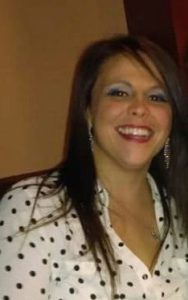MSP strives to connect with alumni to find out more about the work that fulfills their passion for clinical psychology. Life After MSP is our new column that highlights the career journey of our grads.

Name: Leslie Ann Salmen, TLLP, working toward CAADC (MA Class of 2014)
Job Titles: Therapist-II (Access Manager) (Macomb County Community Mental Health); Mental Health Professional (Correct Care Solutions)
Describe your work in clinical psychology after MSP:
For my full-time position with CMH, I work as an Access Manager, screening consumers in Macomb County for appropriate level of care based on symptoms and presenting issues. Access is the screening center for all mental health and substance abuse treatment services in the county. For all individuals seeking treatment using Medicaid, Healthy Michigan or those who are indigent, we are the clinicians who determine what type of treatment, if any, is appropriate based on presenting clinical factors.
I currently am on the SUD team, so I screen all incoming substance abuse calls for detox and residential, intensive outpatient, outpatient and medication assisted therapy services using the criteria set forth by ASAM (American Society of Addiction Medicine) and other clinical screening questions. I also screen individuals seeking mental health services and those with developmental disabilities, matching them to the appropriate provider based on their individualized needs.
Due to my background in cognitive and diagnostic testing and previous work with individuals on the Autism Spectrum, I also work alongside our clinical director in authorizing services for the Autism Benefit Waiver based on the cognitive and diagnostic testing performed. I also complete certificates of need submitted by psychiatric hospitals for inpatient and partial hospitalization based on 401 criteria.
For Correct Care Solutions, I work part time at Macomb County Jail as a mental health professional, screening inmates for risk factors of self harm and harm to others. We also meet with inmates regularly based on their mental health needs to improve their coping in the facility based on their mental health diagnosis and available coping mechanisms. We also screen inmates for and determine if they require psychiatric care/follow-up.
We follow up on KITES, the term used in corrections for mental health care needs, for medication requests, coping issues in the facility and other mental health needs as requested. I work alongside correction officers, nurses, sheriffs and psychiatrists to ensure the inmates mental, spiritual and physical health needs are met within the facility.
What do you like about your work?
I love both of my positions, each day is a new challenge and in very different ways. At Access, screening in substance use, mental health and hospital there is always a new challenge and my clinical skills are frequently used to assess the individual’s needs for treatment while adhering to the least restrictive environment.
I am able to continue working with cognitive and diagnostic testing as the second to our clinical director under the ABA waiver program and this requires me to continually maintain my knowledge and understanding of the changes in policy, including state and federal guidelines that dictate the level of service provided based on the test results.
At Macomb County Jail, I am in a very challenging environment working with a very challenging population, from those who are severely mentally ill and those with dual diagnosis, to those who have active personality disorders and are manipulative, violent criminals.
My ethical skills are honed and professionalism and ability to maintain a clinically significant relationship while under pressure continually challenged. This position reminds me every day to think critically, coordinate with my teammates and other professionals and to maintain composure in any circumstance.
How did your time at MSP prepare you to be successful?
The professors I would say were the number one influences on my success both during my time at MSP and now in my career. All of the professors offered a unique perspective and different training that has shaped and followed me into my career.
Dr. Blackstock’s training in substance abuse disorders and the dangerous symptoms to watch for have helped me be a better screener, more empathic toward the challenging callers and aided me in recommending the appropriate treatments for numerous individuals.
MSP’s extensive training in diagnostic and cognitive testing has provided me a niche in which other professionals I work with lack, allowing me to be offered a unique position working with the clinical director of CMH in a very specialized program.
The coursework and projects helped me see the clinical relationship in a very different way than most of my peers in the field. The agencies I work in hire social workers and counselors alike and while they have similar backgrounds, their training is very different from mine and in many ways I find that to be a huge advantage to me. Having the skills and training I received through MSP has provided me opportunities that are not afforded to other mental health professionals.
Finally, the continuous support of the alumni network and accessibility of former professors and peers is a huge benefit to my continued progress in the field. I know I have a strong network of support in my alma matter and the school, should I ever need to reach out for it. Not many of my colleagues can say that!